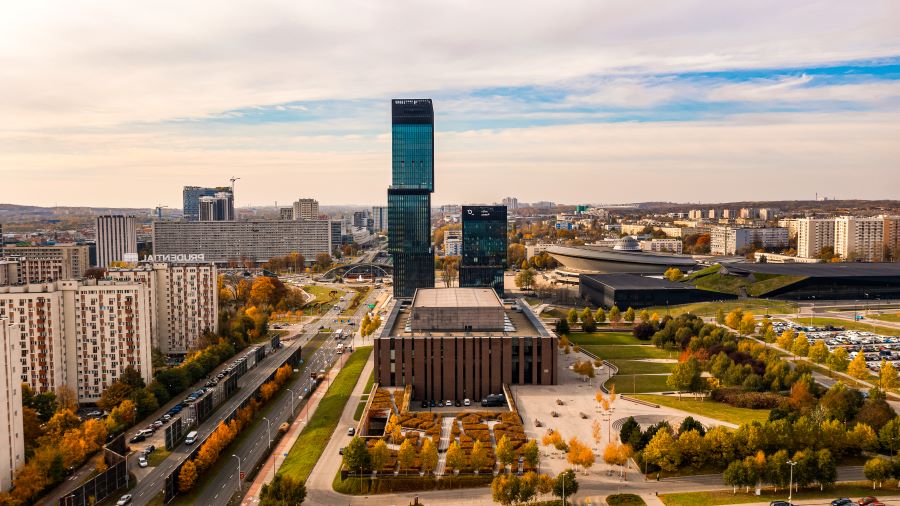W każdym z 50 Tygodni w Mieście Nauki publikujemy tekst o wybranych badaniach prowadzonych w danej tematyce przez naukowców z uczelni wchodzących w skład Konsorcjum Akademickiego – Katowice Miasto Nauki. Teksty dają wgląd w różnorodność zagadnień poruszanych przez naukowców oraz pokazują, jaki potencjał badawczy drzemie w uczelniach tworzących konsorcjum.
| Agnieszka Kliks-Pudlik |
Wśród 50 Tygodni w Mieście Nauki nie mogło zabraknąć Tygodnia Miasta. Lepsze rozumienie działania metropolii i prawnych form zarządzania nią oraz innowacyjne koncepcje rozwoju terytorialnego dla regionów poprzemysłowych stanowią przykłady zagadnień, nad którymi pochylają się badacze z Konsorcjum Akademickiego – Katowice Miasto Nauki.
– Jedną z cech samorządu terytorialnego jest fakt, iż nigdy nie przybierze on postaci skończonej czy ostatecznej. W jego funkcjonowanie wpisana jest ciągła ewolucja i dostosowywanie się do zmieniającego się otoczenia. Dlatego tak istotne jest prowadzenie badań naukowych w tym temacie i tworzenie na ich podstawie narzędzi pozwalających coraz lepiej rozumieć nasze miasta, metropolię i cały region – mówi dr Roman Marchaj z Wydziału Prawa i Administracji Uniwersytetu Śląskiego, kurator Tygodnia Miasta.
Strefa Kultury w Katowicach | Mat. Uniwersytetu Śląskiego
Rozwój dynamiczny, ale zrównoważony
Do dynamicznego, a jednocześnie zrównoważonego rozwoju górnośląskiego obszaru metropolitalnego przyczyniają się prace Obserwatorium Procesów Miejskich i Metropolitalnych, tworzonego przez osiem jednostek: uczelni i instytutów naukowych. Powstało ono przy Uniwersytecie Śląskim z inicjatywy dr. hab. Roberta Pyki, prof. UŚ i jest przez niego koordynowane.
Głównym zadaniem Obserwatorium jest prowadzenie badań powalających lepiej zrozumieć działanie metropolii, które stanowią bardzo złożone struktury, ze szczególnym uwzględnieniem Górnośląsko-Zagłębiowskiej Metropolii (GZM). – Dzięki temu samorządowcy i politycy nie muszą działać po omacku, ale mogą opierać swojej decyzje na rzetelnie gromadzonych danych i wiedzy – wskazuje dr hab. Robert Pyka, prof. UŚ, który od lat prowadzi badania nad zagadnieniami metropolitalnymi.
Badania te pozwalają również oceniać naukowcom obecny stan metropolii, nakreślać wyzwania, jakie przed nią stoją oraz proponować kierunki rozwoju, jakie powinno się obrać w przyszłości.
– Musimy ciągle przypominać, że metropolia to nie tylko instytucja powstała w 2017 roku, ale przede wszystkim jej mieszkańcy, ich wspólny potencjał i działania, które napędzają rozwój całego regionu. Metropolia to ludzie, a instytucja, czyli GZM ma im towarzyszyć tworząc warunki ku temu, aby jeszcze efektywniej mogli wykorzystywać swoje możliwości. W Obserwatorium staramy się podpowiadać, jak to robić – podkreśla dr hab. Robert Pyka, prof. UŚ.
Wsparcie procesów restrukturyzacji
Innowacyjne koncepcje rozwoju terytorialnego na rzecz tworzenia podstaw dla transformacji regionów przemysłowych to z kolei tematy projektów badawczych, którymi zajmują się naukowcy ze Śląskiej Szkoły Badań Regionalnych, działającej w Uniwersytecie Ekonomicznym w Katowicach.
To idea łącząca naukowców z kilku jednostek, głównie z założonej przed laty przez prof. Andrzeja Klasika Katedry Badań Strategicznych i Regionalnych. Już od ponad 40 lat badacze skupieni w tej jednostce zajmują się gospodarką regionu – inwestycjami czy miejscami pracy, ale także procesami rozwoju lokalnego.
– Z naszą wiedzą i doświadczeniem przez te lata dotarliśmy chyba do wszystkich miast i gmin w regionie – pomagając opracowywać ich strategie i programy społeczno-gospodarcze, przygotowując projekty infrastrukturalne i społeczne, animując rozwój kreatywności i przedsiębiorczości czy prowadząc szkolenia. Prowadzimy także kierunki studiów, których absolwenci znajdują zatrudnienie w samorządzie oraz spółkach komunalnych. Badaliśmy i wspieraliśmy procesy restrukturyzacji przemysłu w regionie, jakie miały miejsce na przełomie XX i XXI wieku. Obecnie jesteśmy jednym z najbardziej opiniotwórczych ośrodków naukowych w tematyce unijnego Zielonego Ładu i Sprawiedliwej Transformacji – podkreśla dr Marcin Baron z Katedry Badań Strategicznych i Regionalnych na Wydziale Gospodarki Przestrzennej i Transformacji Regionów Uniwersytetu Ekonomicznego w Katowicach.
Naukowiec jest zaangażowany w projekt BOLSTER (Bridging Organizations and marginalized communities for Local Sustainability Transitions in EuRope), finansowany z unijnego programu Horyzont. Jego celem jest prowadzenie badań na rzecz identyfikacji społeczności, które z różnych względów – ekonomicznych i społecznych – nie potrafią lub nie chcą się mierzyć z wyzwaniami, jakie niosą ze sobą zielona gospodarka i transformacja energetyczna Europy.
Prawna strona metropolii
Z kolei badaniem prawnych form zarządzania obszarami metropolitalnymi zajmuje się dr Roman Marchaj z Zespołu prawa samorządu terytorialnego na Wydziale Prawa i Administracji Uniwersytetu Śląskiego.
– W pierwszej fazie badań koncertowałem swoją uwagę na opisaniu charakterystyki prawnej związku metropolitalnego oraz jego miejsca w strukturach administracji publicznej. Było to szczególnie istotne, bowiem tego rodzaju konstrukcja normatywna wcześniej w Polsce nie funkcjonowała. W ramach drugiej fazy, na bazie wcześniej zgromadzonej wiedzy, podejmuję próbę dokonania ewaluacji tej konstrukcji ustrojowej, jednocześnie podejmując próbę formowania wniosków, których uwzględnienie przez ustawodawcę może usprawnić działanie związku metropolitalnego – opowiada.
Na temat działania związku metropolitalnego naukowiec opublikował kilkanaście artykułów naukowych. Ponadto, w ramach grantu z Narodowego Centrum Nauki, wraz z prof. Bogdanem Dolnickim oraz prof. Moniką Augustyniak, badacze wydali monografię pt. „Status związku metropolitalnego w Polsce a metropolii we Francji. Studium prawnoporównawcze”. Omawia ona problematykę związaną z organizacją i funkcjonowaniem związku metropolitalnego w województwie śląskim w porównaniu z metropoliami we Francji (Paryż, Lyon i Marsylia).
Pełny program wydarzeń Tygodnia Miasta na stronie wydarzenia.






